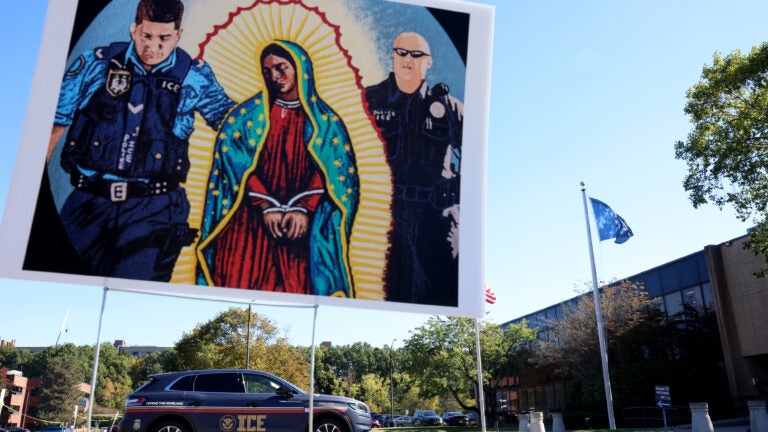Local News
“Sometimes family members immediately come to us, so we know who a detainee is right away. Other times it takes more effort and help from a range of directions after someone is detained.”

After a man doing his laundry was detained by immigration agents in Somerville last month, the federal government confirmed they had made an arrest, but didn’t share his identity with local police.
Instead, city officials were left “piecing together information” to identify him, city spokesperson Denise Taylor said.
The arrest, which was publicized on social media by state Rep. Mike Connolly, was filmed by bystanders, including a local attorney. At the time, Connolly said the man “benefited from the fact that our community has both a lot of caring, welcoming people, and a lot of activists.”
“Sometimes family members immediately come to us, so we know who a detainee is right away,” Taylor said. “Other times it takes more effort and help from a range of directions after someone is detained.”
The man, who Somerville officials identified only by the name Luiz, was then referred to Greater Boston Legal Services. His lawyer, Annery Miranda, said in an interview unrelated to his arrest that concerned neighbors who quickly identify detained community members are inspiring.
“If we get involved, chances are the people have loved ones that know, or neighbors that know,” Miranda said, referring to GBLS. “ … But, what happens to people who — no one witnessed it, or they don’t have a big sense of community or people who are close to them that can just call us immediately?”
How cities work to identify people taken by ICE, and why
In Lynn last month, a “community hero” was detained by ICE. Emmanuel Kenga, originally from the Democratic Republic of Congo and known as Manny, was detained by federal agents at his scheduled asylum appointment in Burlington, according to an online fundraiser. The fundraiser described Kenga as a devoted neighbor who delivers groceries to needy families and works with several community groups.
Lynn Mayor Jared Nicholson, who condemned the arrest, said his administration worked to locate him “when his families and colleagues reported him missing and suspected that he had been detained. We subsequently joined his family and community members in the public calls for his release.”
Lynn also works to obtain information about detainees “through our public safety contacts” and relies on collaboration with its federal delegation, Nicholson said.
The City of Somerville works with groups across the city to identify any detentions, particularly when the Department of Homeland Security declines to share information.
“Community members, community organizations who might work with the individual, faith communities, employers, elected officials checking with people in their neighborhoods/districts, and more have helped identify detainees,” Taylor said. “Staff then quickly work to contact family members to confirm and offer services. In some cases, they’ve had to seek out overseas relatives to confirm identities.”
The City of Chelsea has no formal policies around identifying people arrested by ICE, but shares legal resources with the community while acknowledging “the urgency and importance of timely information in these situations, especially for families and community members seeking to locate loved ones,” a spokesperson said.
That urgency, in part, comes from the federal government’s rapid transfers of immigration detainees. When someone is detained, legal representatives need to file a habeas corpus petition — which asks a judge to determine if the person is illegally detained — as soon as possible, advocates told Boston.com. Some people in ICE detention in Massachusetts can be rapidly transferred out of state, which could expedite their deportation.
“If a person is outside of Massachusetts, the court in Massachusetts can’t readily assert authority, and advocates are often rushing to federal district court because they’re trying to get their clients not transferred out of the jurisdiction,” Miranda said. “ICE is becoming faster and faster at getting people out.”
While the federal government points to bed availability and other jurisdiction matters, advocates say the rapid transfers sow fear and chaos. Some believe the government is “forum shopping” for more sympathetic judges, Miranda said.
“It just becomes that much more difficult when people are in other states,” Miranda said, “(because) you’re not barred in that state, and trying to get somebody to file in federal court in a different state, and not knowing those courts. It just becomes really tough.”
Sign up for the Today newsletter
Get everything you need to know to start your day, delivered right to your inbox every morning.




